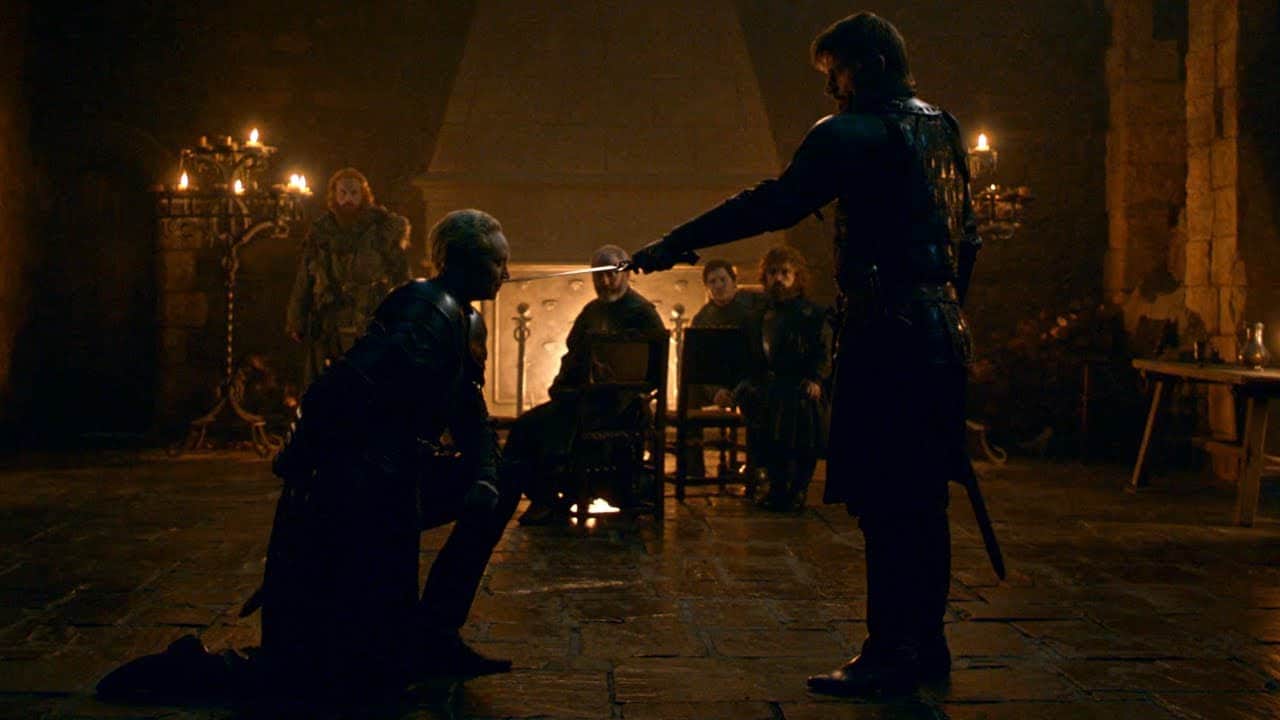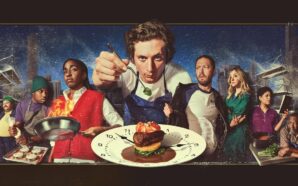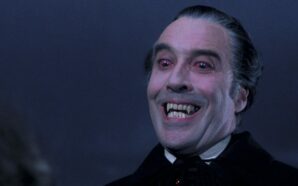Each week, exactly one year to the day after its first airing, I’m looking back at every episode of Game of Thrones’ controversial final season now that the dust has settled to see whether it’s worthy of its infamous reputation. Last week I reviewed the season premiere ‘Winterfell’ and today I’m discussing the second episode ‘A Knight of the Seven Kingdoms’, which sees the ultimate reunion of characters in Winterfell, with new alliances formed and old ones erased, as the battle against the dead draws ever closer.
Looking at the final season as a whole, I’m shocked this episode exists. To dedicate a sixth of your season, following a premiere that was little but table setting, to slow character drama and the ultimate calm before the storm episode is a bold move. Yes, I wish the entire seventh and eighth seasons could be stretched and repurposed to this pacing but with a mere 6 hours to conclude your story, this isn’t just an episode that I’m surprised exists but is also an episode that probably shouldn’t exist. If the season was restructured and this episode repurposed so the final six instalments flowed at the same pace, rather than the mad rush we get from the fourth episode onwards, then the season itself would probably be much better. But I’m glad it’s not. This is an episode that shouldn’t exist but I love that it does. It worsens the season but the episode on its own is wonderful. It’s the true forgotten gem of the latter seasons of Game of Thrones, and is not only the best episode of the final two seasons but one of the greatest of the entire series.
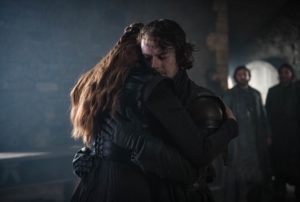 Unlike its counterparts, A Knight of the Seven Kingdoms isn’t plot-heavy or filled with huge character choices but rather is a thematic study of the characters and the situation they find themselves in. It’s an episode all about forgiveness. Jaime arrives at Winterfell a changed man and, after some character interrogation, is accepted as such. Jorah brings up his past with Daenerys and comments on his own penance, even being accepted by his estranged house. Jorah also vouches for Tyrion to Daenerys, asking her to forgive him for his past tactical mistakes. Theon returns to Winterfell to fight for the Starks – his family – and is greeted with open arms despite the monstrosities he committed within its walls. Tyrion even brings up that most of the people present once fought against the Starks and yet are now united in that family’s homestead, willing to die to defend it, and Westeros at large. It’s a perfect final season episode – a swansong for writer Bryan Cogman – and brilliantly showcases the incredible character development that has been the core of the show for 7-and-a-bit seasons at this point. Despite the huge and controversial actions that will come in the next four episodes, this instalment seems to mark the conclusion of so many character journeys.
Unlike its counterparts, A Knight of the Seven Kingdoms isn’t plot-heavy or filled with huge character choices but rather is a thematic study of the characters and the situation they find themselves in. It’s an episode all about forgiveness. Jaime arrives at Winterfell a changed man and, after some character interrogation, is accepted as such. Jorah brings up his past with Daenerys and comments on his own penance, even being accepted by his estranged house. Jorah also vouches for Tyrion to Daenerys, asking her to forgive him for his past tactical mistakes. Theon returns to Winterfell to fight for the Starks – his family – and is greeted with open arms despite the monstrosities he committed within its walls. Tyrion even brings up that most of the people present once fought against the Starks and yet are now united in that family’s homestead, willing to die to defend it, and Westeros at large. It’s a perfect final season episode – a swansong for writer Bryan Cogman – and brilliantly showcases the incredible character development that has been the core of the show for 7-and-a-bit seasons at this point. Despite the huge and controversial actions that will come in the next four episodes, this instalment seems to mark the conclusion of so many character journeys.
While the first episode focuses on a multitude of characters, although probably Jon most significantly, the second is very much Jaime Lannister’s episode. He’s the perfect encapsulation of the themes of A Knight of the Seven Kingdoms. While nothing is ever black or white in Game of Thrones, Jaime began the series as one of the most detestable villains. An arrogant and violent man who would do anything for his perverse love. But his arc has been one of the greatest accomplishments of the show and, after years of gradual change, he rides into Winterfell having left Cersei behind and ready to sacrifice his life for the people of Westeros. Upon returning for the first time since pushing Bran from the tower in the very first episode, Jaime has to literally stare his past misdeeds in the face when Bran greets him like an old friend.
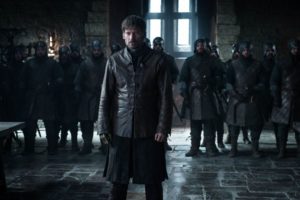 As the Three-Eyed Raven, Bran knows of Jaime’s immense change of character without an explanation and while the Lannister is granted acceptance from him immediately, Jaime almost wants to be hated and seen as the villain. But for the entire episode he is vouched for and readily accepted by those around him. Brienne vouches for him in front of Daenerys, he fits right in during the fantastic scene by the fireplace and Tyrion exchanges brotherly banter with him straight away. He realises his friends have accepted him as a good man (although their desperate circumstances certainly aid this) and his final step is self-actualisation. He walks the castle he was once at his most villainous within, talks to those he’s wronged, and most importantly faces himself, accepting the reflection staring back at him. As Tyrion states, Jaime has faced the “perils of self-betterment” and is now his best self, even if that now means he has to face death. His last act before the encroaching battle is to knight Brienne, using his title and powers for a meaningful act of kindness and bring a smile to his friend’s face. It’s perfect. And quite hilarious that Brienne can’t deal with the fact that Jaime isn’t insulting her. As for where Jaime’s arc goes from here? Well, while I don’t subscribe to the extreme negativity towards the season overall, where Jaime’s journey takes him in later episodes still makes me angry. But that’s a point for another review. This episode is Jaime at his best and the true conclusion of his fantastic arc.
As the Three-Eyed Raven, Bran knows of Jaime’s immense change of character without an explanation and while the Lannister is granted acceptance from him immediately, Jaime almost wants to be hated and seen as the villain. But for the entire episode he is vouched for and readily accepted by those around him. Brienne vouches for him in front of Daenerys, he fits right in during the fantastic scene by the fireplace and Tyrion exchanges brotherly banter with him straight away. He realises his friends have accepted him as a good man (although their desperate circumstances certainly aid this) and his final step is self-actualisation. He walks the castle he was once at his most villainous within, talks to those he’s wronged, and most importantly faces himself, accepting the reflection staring back at him. As Tyrion states, Jaime has faced the “perils of self-betterment” and is now his best self, even if that now means he has to face death. His last act before the encroaching battle is to knight Brienne, using his title and powers for a meaningful act of kindness and bring a smile to his friend’s face. It’s perfect. And quite hilarious that Brienne can’t deal with the fact that Jaime isn’t insulting her. As for where Jaime’s arc goes from here? Well, while I don’t subscribe to the extreme negativity towards the season overall, where Jaime’s journey takes him in later episodes still makes me angry. But that’s a point for another review. This episode is Jaime at his best and the true conclusion of his fantastic arc.
While forgiveness is the key theme of the episode, it also focuses on how all these characters spend what could be their final hours. All of them, in different ways, embrace their humanity before facing the inhuman. To live before death literally comes for them. They all seek the comfort of others in a variety of ways. Arya has sex with Gendry, taking maybe her final step into adulthood within her childhood home. Sansa and Theon do something as simple as have a meal together, which makes for a heart-warming moment. True to his bookish nature, Tyrion wishes to hear a story despite the fantasy tales he was so obsessed with as a child now seeming dull to his past real-life experiences. Many gather by a warm fireplace to drink and sing songs before the fateful horn blows. Even the Hound seeks comfort from Beric atop the city wall, even if he won’t admit it. The Night King is coming for them all and whatever happens next, whether death or bad storytelling, won’t take away from these wonderful moments.
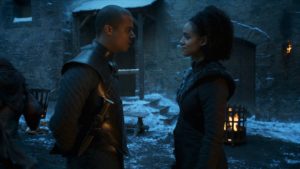 While the episode gets multiple characters to a natural end point, it also includes several scenes that look back on the past in interesting ways. The under-served Davos gets a great little moment in which he comes across a young girl with greyscale, bringing back painful memories of Shireen. Not only does it highlight Davos’ struggle and allow him to help save this girl in way he couldn’t with Shireen, but it also puts focus on the regular citizens of Westeros. That’s who this battle is for and, with so much focus being put on fewer and fewer main characters, it’s easy to forget. But scenes like this, as well as the sheer number of bustling extras in the Winterfell scenes, drive this point home. Jon, Ed, Sam and Tormund are also reunited and we see them – three Night’s Watch and one Wildling – stand atop the city wall as they once did at The Wall. The frontier has moved and Winterfell is now the last best hope against what comes from the north. And while some characters look back, Missandei and Grey Worm look to the future and make plans to visit Naath after the battle. This is a well-worn set-up to a death but here it’s thankfully subverted somewhat. Surprisingly, Grey Worm doesn’t die in the battle but Missandei does afterwards.
While the episode gets multiple characters to a natural end point, it also includes several scenes that look back on the past in interesting ways. The under-served Davos gets a great little moment in which he comes across a young girl with greyscale, bringing back painful memories of Shireen. Not only does it highlight Davos’ struggle and allow him to help save this girl in way he couldn’t with Shireen, but it also puts focus on the regular citizens of Westeros. That’s who this battle is for and, with so much focus being put on fewer and fewer main characters, it’s easy to forget. But scenes like this, as well as the sheer number of bustling extras in the Winterfell scenes, drive this point home. Jon, Ed, Sam and Tormund are also reunited and we see them – three Night’s Watch and one Wildling – stand atop the city wall as they once did at The Wall. The frontier has moved and Winterfell is now the last best hope against what comes from the north. And while some characters look back, Missandei and Grey Worm look to the future and make plans to visit Naath after the battle. This is a well-worn set-up to a death but here it’s thankfully subverted somewhat. Surprisingly, Grey Worm doesn’t die in the battle but Missandei does afterwards.
While the episode finds friends and old enemies uniting under a common goal and forgiving past indiscretions, two key characters just can’t do so. We see Sansa and Daenerys try and find common ground and they almost do. They bond over Jon, and joke about his limited stature, but it’s clear by the end of the conversation that this is all political maneuvering. Despite the literal coming of death, Dany is still obsessed with the Iron Throne above all else and Sansa – after going on maybe the second-best character journey after Jaime – is aware of how the game is played more than anyone else at Winterfell and refuses to fall for it, instead seeking northern independence. For better (Sansa) or worse (Daenerys), they can’t focus on the battle at hand and despite enjoying the thematic underpinning of forgiveness the episode offers, I love that these two characters are still playing the titular game.
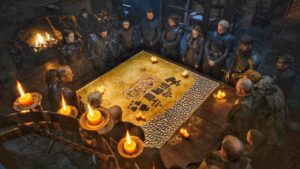 The episode not only offers slow, contemplative character drama but also a well-executed build in tension throughout as the army of the dead could arrive at any second. Of course, they finally arrive in the closing seconds of the episode setting up the huge battle next week, but over the course of the hour we see preparations made and weapons and defenses built. There’s even a cool preparation montage as any great battle should have. The major players convene for a discussion on battle tactics, possibly the biggest congregation of primary cast members the show ever assembles, and we finally learn why the Night King wants to kill Bran: “He wants to erase this world, and I am its memory”. It’s a great line and an intriguing motive but that’s all we get. Everything with the Three-Eyed Raven is so underexplained it’s hard to care. It’s all so very vague and therefore becomes almost meaningless, being little but sweet-sounding sentences.
The episode not only offers slow, contemplative character drama but also a well-executed build in tension throughout as the army of the dead could arrive at any second. Of course, they finally arrive in the closing seconds of the episode setting up the huge battle next week, but over the course of the hour we see preparations made and weapons and defenses built. There’s even a cool preparation montage as any great battle should have. The major players convene for a discussion on battle tactics, possibly the biggest congregation of primary cast members the show ever assembles, and we finally learn why the Night King wants to kill Bran: “He wants to erase this world, and I am its memory”. It’s a great line and an intriguing motive but that’s all we get. Everything with the Three-Eyed Raven is so underexplained it’s hard to care. It’s all so very vague and therefore becomes almost meaningless, being little but sweet-sounding sentences.
It’s Bran’s memories and knowledge of all history, the very thing that puts a target on his back, which will come to mark a new era for Westeros when he’s named king. This is a fascinating idea and there’s a way to make this all work in a meaningful way, but there’s so little explanation and discussion of it that much of it falls flat, especially when his time travel ability never really pays off. Tyrion asks to hear Bran’s story at the end of the battle tactics scene which sets up his coronation as king from a plot standpoint but there’s not enough in the season to set it up from a thematic standpoint. After eight seasons of plotting who ends up on the throne, we’re left with a character whose entire being is undefined and therefore so is the state of his reign. We need to see Bran actually do something and be a character rather than a bland but key plot device, first for the battle against the dead and then the ultimate fate of Westeros. It’s like they kept all discussion and important information surrounding Bran a secret just to play off his crowning as a twist in the finale. But this is very much a problem with the season as a whole, maybe even the series as a whole, and not this episode exclusively.
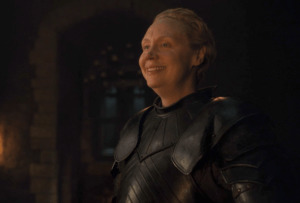 With the episode concerned with building tension and placing many beloved characters on the precipice of death, there is thankfully still plenty of good humour and lighter moments. This could easily be the most morbid and depressing episode of the series but instead it finds a good balance between light and dark, even containing some of the funniest moments of the entire show. Many come from the scene surrounding the fireplace late in the episode where Jaime, Tyrion, Brienne, Podrick, Davos and Tormund drink and sing. It’s a wonderful scene that showcases the newfound humanity and friendships of many of these characters before they march off to die. Well, none of them do end up dying but that’s a discussion for next week and not a slight on this episode. It’s this scene from where the episode gets its title as Brienne is knighted by Jaime, showing his companionship with her and offering a final action on his quest to be better. It feels like an ending to Brienne too after spending so much of her time protecting the Starks and gaining nothing in return. Her heart-warming smile is one of my favourite moments of all eight seasons.
With the episode concerned with building tension and placing many beloved characters on the precipice of death, there is thankfully still plenty of good humour and lighter moments. This could easily be the most morbid and depressing episode of the series but instead it finds a good balance between light and dark, even containing some of the funniest moments of the entire show. Many come from the scene surrounding the fireplace late in the episode where Jaime, Tyrion, Brienne, Podrick, Davos and Tormund drink and sing. It’s a wonderful scene that showcases the newfound humanity and friendships of many of these characters before they march off to die. Well, none of them do end up dying but that’s a discussion for next week and not a slight on this episode. It’s this scene from where the episode gets its title as Brienne is knighted by Jaime, showing his companionship with her and offering a final action on his quest to be better. It feels like an ending to Brienne too after spending so much of her time protecting the Starks and gaining nothing in return. Her heart-warming smile is one of my favourite moments of all eight seasons.
After learning the truth of his heritage last episode, Jon spends most of A Knight of the Seven Kingdoms quiet and sullen. He’s struggling to come to terms with the information in his own head before he tells Dany at the episode’s close. However, the scene is abruptly ended without a full discussion of the personal and monarchical fallout of this revelation by the arrival of the dead. It’s a disappointment that this incredible episode is soured somewhat by such a cheap trick at the end. The revelation is dramatic and important enough without the interruption of the other huge threat to their lives in the middle of it.
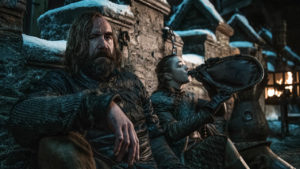 And so, the credits begin to roll as the White Walkers arrive with their legions of undead; the battle not just for Winterfell but the entire Seven Kingdoms about to begin, now with a newly minted knight and a united front of forgiven warriors. Despite the problems of the season, mainly emanating from the episodes yet to come, A Knight of the Seven Kingdoms still stands proud as an amazing instalment of the series. It’s undoubtably the best episode of the final two seasons and one of the greatest of the entire series. Not only does it harken back to those slow character-driven instalments of the early seasons of the show but it also pays off and satisfyingly concludes many of the characters arcs which began in those previous episodes. The road past here is rough, although not without merit or entertainment, and I’m just immensely happy that this truncated final season could offer us one last deep and powerful look at these characters we’ve come to love over the past decade.
And so, the credits begin to roll as the White Walkers arrive with their legions of undead; the battle not just for Winterfell but the entire Seven Kingdoms about to begin, now with a newly minted knight and a united front of forgiven warriors. Despite the problems of the season, mainly emanating from the episodes yet to come, A Knight of the Seven Kingdoms still stands proud as an amazing instalment of the series. It’s undoubtably the best episode of the final two seasons and one of the greatest of the entire series. Not only does it harken back to those slow character-driven instalments of the early seasons of the show but it also pays off and satisfyingly concludes many of the characters arcs which began in those previous episodes. The road past here is rough, although not without merit or entertainment, and I’m just immensely happy that this truncated final season could offer us one last deep and powerful look at these characters we’ve come to love over the past decade.
Do you share my love of this season 8 episode? Does the rest of the season tarnish A Knight of the Seven Kingdoms in your eyes? Let me know in the comments and be sure to geek out with me about TV, movies and video-games on Twitter @kylebrrtt. Join me next week when, exactly one year after its first airing, I revisit the third episode of the final season, ‘The Long Night’, which mistakes scale for substance.




